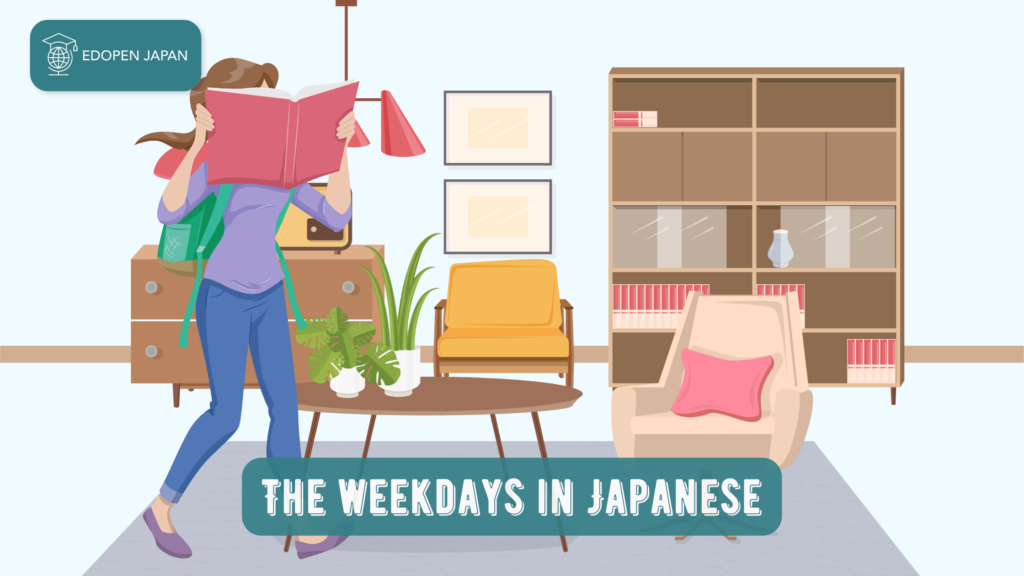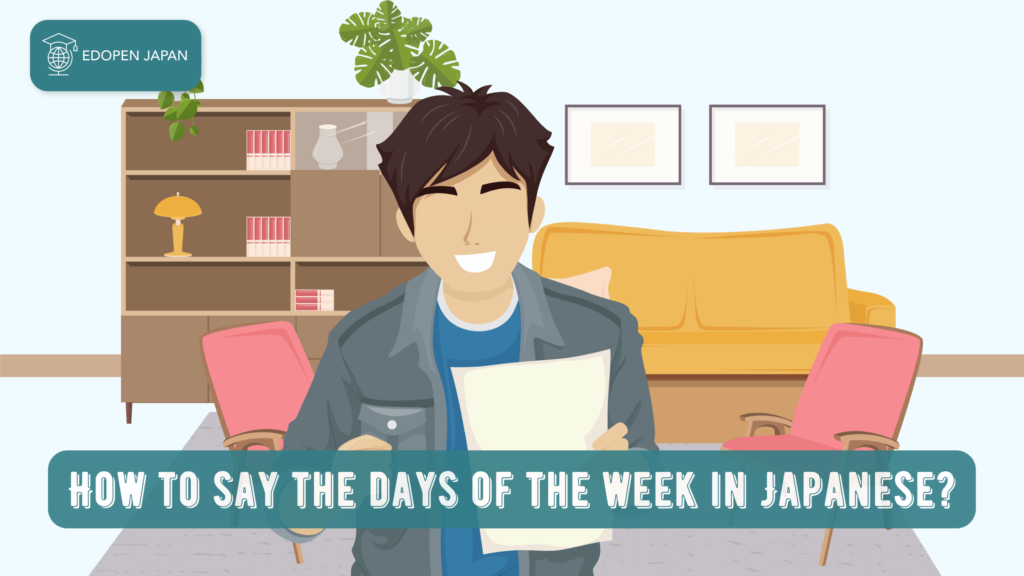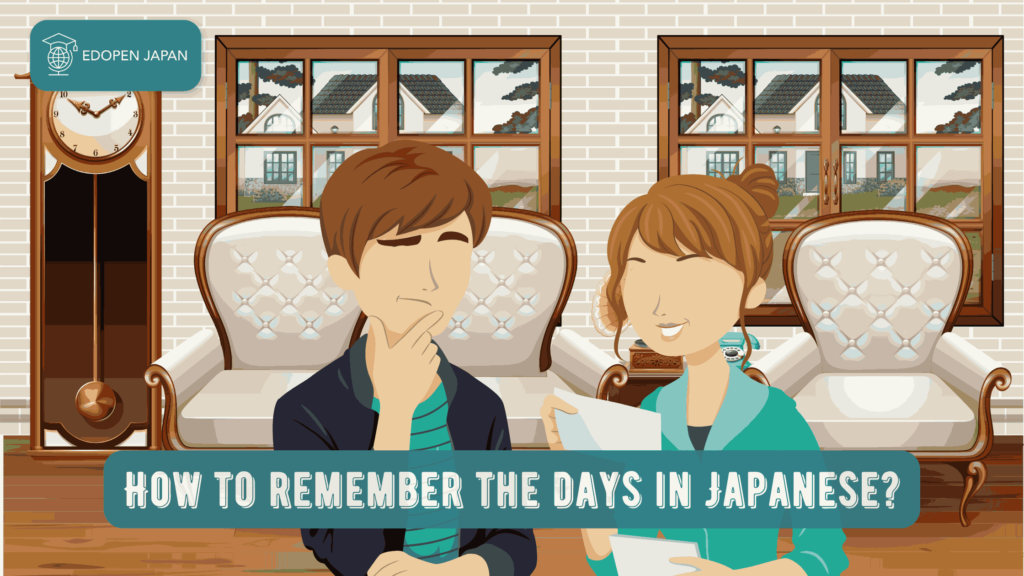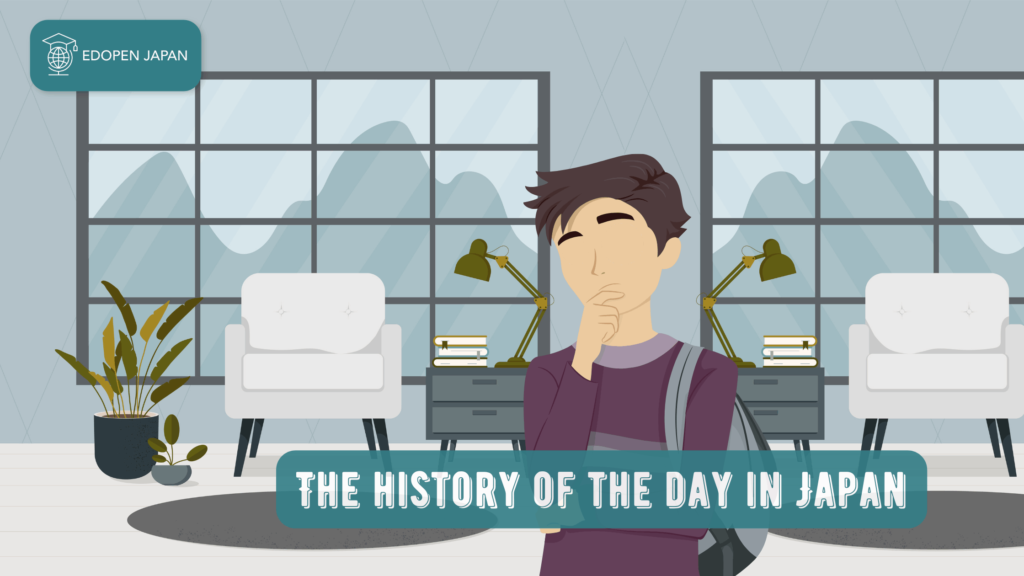If you intend to travel to or work in Japan, you may have questions about the days of the week and business hours. This article will describe how to correctly pronounce the days of the week in Japanese and the functionality of the Japanese weekday system.
You’ll be pleasantly surprised by the similarities between English and Japanese on this topic. The Japanese week begins on Sunday and ends on Saturday, so it is important to keep it in mind while discussing any scheduled activities or plans. Most Japanese calendars follow this model. This guide presents an easy way to remember this information. Let’s get started!
In addition, if you are currently studying Japanese and wish to enhance your comprehension of specific topics, please peruse our extensive selection of reading materials tailored just for you below!
Read also:
How Long Does It Takes to Learn Japanese?
How to Learn Japanese Fast: 10 Smart Methods
10 Best Ways to How to Learn Japanese Online for FREE
Contents
The weekdays in Japanese

The workweek usually consists of weekdays, excluding designated holidays such as Sundays, national holidays, transfer holidays, and extended holiday periods, among others, commonly observed by most companies. The workweek may or may not comprise Saturdays and other non-holiday weekdays.
In Japan, schools, businesses, and government agencies usually classify Monday through Friday as “weekdays,” except for national holidays, transfer holidays, year-end holidays, Golden Week, Obon Time, and other holidays.
Thus, if you work on weekends or holidays and take a day off during the week between Monday and Friday, it will still be considered a “weekday.”
Saturday was previously considered a weekday. Nonetheless, most schools, businesses, and government agencies began observing Saturdays and Sundays as holidays following the introduction of the two-day week system.
As a result, the number of schools, businesses, and government agencies closed on Saturdays has considerably increased.
Weekdays in company
The days of the week in Japan depend on the particular company, but usually, Monday through Friday are considered “weekdays”.
| Weekdays | Remarks | |
|---|---|---|
| Public Institution | “Monday-Friday” excluding public holidays | Basically, excluding holidays |
| Transportation | “Monday-Friday” excluding public holidays | In the schedule of transportation means such as railroads and busses, “Monday-Friday” is set as the weekday schedule. |
| Office | “Monday-Friday” excluding Public holidays | It depends on each company |
| Hotel | Mainly “Monday-Thursday” is a weekday | Prices tend to be higher on Saturdays, Sundays, and the day before holidays. Sometimes, Friday isn’t a “weekday” |
| Dictionary | Basically, “Monday-Saturday” is a weekday stand. | Often called “days other than Sundays and holidays” it means “Saturday can be excluded.” |
The business hours & holidays in Japan
The operating hours of banks, post offices, department stores, museums, parks, and other public facilities in Japan may diverge from those in your home country. These hours also fluctuate throughout the country.
Here’s a general rundown of some of the more ubiquitous businesses and services. Nevertheless, ensure to review the websites for the opening hours of the locations or facilities you plan to visit.
| Weekdays | Saturday | Sunday & National Holiday | |
|---|---|---|---|
| Bank | 09:00-15:00 | Closed | Closed |
| Post Office | 09:00-17:00 | Closed | Closed |
| Department Store | 10:00-20:00 | 10:00-20:00 | 10:00-19:30 |
| Shop | 10:00-20:00 | 10:00-20:00 | 10:00-20:00 |
| Museum | 10:00-17:00 | 10:00-17:00 | 10:00-17:00 |
| Office | 09:00-17:00 | Closed | Closed |
The holidays in Japan
In addition to the standard national holidays, there are also extended vacation periods when the majority of the nation takes time off work to visit the beaches, mountains or spend time with family.
The last week of December through the first week of January, “Golden Week” (a few days in late April through May), and the “Obon Vacation” in mid-August are three of the main vacation periods. Numerous businesses shut down during the days surrounding New Year’s Day.
During Golden Week, there are numerous domestic and international tourists, while during the “Obon” holiday, many Japanese people travel to their families in more rural areas of the country. Traffic and resorts are especially crowded during these periods. Please refer to the list of Japanese Public Holidays provided below.
| Date | Name of the Day |
|---|---|
| January 1st | New Year’s Holiday |
| 2nd Monday of January | Coming-of-Age Day |
| February 11th | National Foundation Day |
| February 23rd | The Emperor’s Birthday |
| March 20th or March 21st | Vernal Equinox Day |
| April 29th | Showa Day |
| May 3rd | Constitution Memorial Day |
| May 4th | Greenery Day |
| May 5th | Children Day |
| 3rd Monday of July | Marine Day |
| 3rd Monday of September | Respect for the Aged Day |
| September 22nd or September 23rd | Autumnal Equinox Day |
| 2nd Monday of October | Health and Sports Day |
| November 3rd | Culture Day |
| November 23rd | Labor Thanksgiving Day |
How to say the days of the week in Japanese?

Please look at the following table to know how to say the days of the week in Japanese.
| English | Kanji | Hiragana | Romaji |
|---|---|---|---|
| Monday | 月曜日 | げつようび | Getsuyoubi |
| Tuesday | 火曜日 | かようび | Kayoubi |
| Wednesday | 水曜日 | すいようび | Suiyoubi |
| Thursday | 木曜日 | もくようび | Mokuyoubi |
| Friday | 金曜日 | きんようび | Kinyoubi |
| Saturday | 土曜日 | どようび | Doyoubi |
| Sunday | 日曜日 | にちようび | Nichiyoubi |
You may have noticed that all the names of the weekdays in Japanese comprise of three kanji, with the final two being always the same. Similar to English, the word for each day of the week includes the word ようび (曜日) which means “day” in English. The term ようび (曜日 – youbi / yōbi) originates from the Chinese character 曜日 and is consistently used with words denoting the days of the week.
The meaning behind the day-name in Japanese
The days of the week have their origins in the seven celestial bodies of the solar system, which were known in ancient times: the Sun, the Moon, and the planets Mars, Mercury, Jupiter, Venus, and Saturn. This model is utilized in American English as well.
Each day of the week is associated with its corresponding celestial body in both English and Japanese cultures. Refer to the table below to determine the significance of each day.
| English | Kanji | Romaji | Meaning | Planet |
|---|---|---|---|---|
| Monday | 月曜日 | Getsuyoubi | Moon | Moon |
| Tuesday | 火曜日 | Kayoubi | Fire | Mars |
| Wednesday | 水曜日 | Suiyoubi | Water | Mercury |
| Thursday | 木曜日 | Mokuyoubi | Wood | Jupiter |
| Friday | 金曜日 | Kinyoubi | Gold | Venus |
| Saturday | 土曜日 | Doyoubi | Soil | Saturn |
| Sunday | 日曜日 | Nichiyoubi | Sun | Sun |
How to remember the days in Japanese?

Learning new vocabulary from a list of words can be challenging even for the most talented language learners. To aid in remembering the days of the week, we have provided a brief explanation for each that reflects its corresponding Chinese philosophies of yin-yang and the 5 Taoist elements (Wood, Fire, Earth, Metal, and Water).
1. Monday (月曜日 – Getsuyoubi)
On Mondays in Japan, the name for the day is 月曜日 (getsuyōbi), which means “Moon Day” in English. The Chinese character 月 (getsu) represents a crescent moon and is also used formonths in Japanese. To help remember this, think of Monday as the important day that gets you started for the week!
2. Tuesday (火曜日 – Kayoubi)
Tuesday is known as “Fire Day” in English, because in Japanese it’s called 火曜日 (かようび / Kayoubi), which directly translates to “Fire Day.” To better understand this name, consider Monday your “warm-up day.”
By Tuesday, you should be fully warmed up and ready to tackle the week with enthusiasm. The Chinese character 火 (か / ka) depicts a burning fire with sparks, which reflects the essence of this day.
3. Wednesday (水曜日 – Suiyoubi)
Wednesday in Japanese is 水曜日 (Suiyoubi), which translates to “Water Day”. To recall this day, imagine extinguishing Tuesday’s fire with water on Wednesday. The Chinese character 水 (Sui) resembles flowing water, giving the day its significance as “water day”.
4. Thursday (木曜日 – Mokuyoubi)
Thursday is translated as “Wood Day” in Japanese, which can serve as a reminder of the weekend that seems so close but is yet to come. The Chinese character 木 (Moku) in the word 木曜日 (Mokuyoubi) resembles a tree and symbolizes wood.
5. Friday (金曜日 – Kinyoubi)
Friday is translated as “Gold Day” in Japanese. This day is easy to remember because it’s the golden day we all wait for each week! The philosophy behind the Chinese character 金 (kin) in 金曜日 (Kinyoubi) is that there is a metal hidden in the earth that shines once it’s discovered. This indicates gold or metal.
6. Saturday (土曜日 – Doyoubi)
In American English, Saturday is known as “Ground Day” in Japanese, as it is translated from the Japanese word for Saturday, 土曜日 (どようび / Doyoubi). This term contains the Chinese character 土 (ど / Do), which depicts a mound of earth that was worshipped as the origin of life in ancient times.
7. Sunday (日曜日 – Nichiyoubi)
In American English, Sunday in Japanese is 日曜日, which can be translated as “Sun Day”. You’ll find it easy to remember this day since it’s the same as Sunday in English. The Chinese character 日 (にち / Nichi) used in the word 日曜日 (にちようび / Nichiyoubi) means sun.
The history of the day in Japan

The seven-day week system is believed to have originated in ancient Babylonia. However, each day of the week was established by ancient Rome. When Japan adopted the Western calendar, they adopted names for the seven days of the week, too.
These names were partly derived from the Latin system. The Romans named the days of the week after the seven planets of classical astronomy and numbered them in the order of Sunday first. The East Asian weekday naming system closely resembles the Latin system and is founded on the “Seven Luminaries” (七曜 shichiyō), which includes the Sun, Moon, and the five planets that are visible to the naked eye.
The planets in our solar system were named after the five elements of traditional East Asian philosophy: Fire (Mars), Water (Mercury), Wood (Jupiter), Metal (Venus), and Earth (Saturn). The Japanese monk Kobo Daishi brought the Chinese transliteration of the planetary system to Japan.
Diaries from the Heian Period of Fujiwara no Michinaga show that the seven-day system was in use during this time. It was utilized for astrological purposes until it was replaced with a Western-style calendar during the Meiji era.

There will be occasions when it is necessary to communicate time expressions such as “last week” or “next month”. To facilitate this, here is a list of essential vocabulary. Presented below are the fundamental terms.
| English | Kanji | Hiragana | Romaji |
|---|---|---|---|
| Today | 今日 | きょう | Kyou |
| Tomorrow | 明日 | あした | Ashita |
| Yesterday | 昨日 | きのう | Kinou |
| The day after tomorrow | 明後日 | あさって | Asatte |
| The day before yesterday | 一昨日 | おととい | Ototoi |
| Everyday | 毎日 | まいにち | Mainichi |
| This week | 今週 | こんしゅう | Konshuu |
| Next week | 来週 | らいしゅう | Raishuu |
| Last week | 先週 | せんしゅう | Senshuu |
| The weekend | 週末 | しゅうまつ | Shuumatsu |
| Every week | 毎週 | まいしゅう | Maishuu |
| A week ago | 1週間前 | いっしゅうかんまえ | Isshuukan-mae |
| 3 weeks later | 3週間後 | さんしゅうかんご | Sanshuukan-go |
| This month | 今月 | こんげつ | Kongetsu |
| Last month | 先月 | せんげつ | Sengetsu |
| Next month | 来月 | らいげつ | Raigetsu |
| Every month | 毎月 | まいつき | Maitsuki |
| Two months ago | 2か月前 | にかげつまえ | Nikagetsu-mae |
| Three months later | 3か月後 | さんかげつご | Sankagetsu-go |
| This year | 今年 | ことし | Kotoshi |
| Last year | 去年 | きょねん | Kyonen |
| Next year | 来年 | らいねん | Rainen |
| The year before last | 一昨年 | おととし | Ototoshi |
| The year after next | 再来年 | さらいねん | Sarainen |
| Every year | 毎年 | まいとし | Maitoshi |
There are some patterns here! Please look at the following example:
先 (Sen or Saki) means “Previous”
今 (Ima or Kon) means “Now” or “Current”
来 (Rai) means “Coming”
後 (Ato or Go) means “After”
前 (Mae) means “Before”
Summarize
- In Japan, most organization regards “Monday to Friday” as “Weekdays”, and Saturdays and Sundays as holidays.
- Five planets are named after the five elements in the traditional East Asian philosophical system: Fire (Mars), Water (Mercury), Wood (Jupiter), Metal (Venus), and Earth (Saturn) were brought to Japan in the Heian period.
- Every day of the week is related to the same celestial body in English and Japanese. Also, Each day of the week is named after a combination of Chinese philosophies of yin-yang, and the 5 Taoist elements (Wood, Fire, Earth, Metal, and Water).
- It is better to know how to learn not only “days of the week” but also other phrases such as “This week” and “Next month” to expand your conversation vocabulary more.













